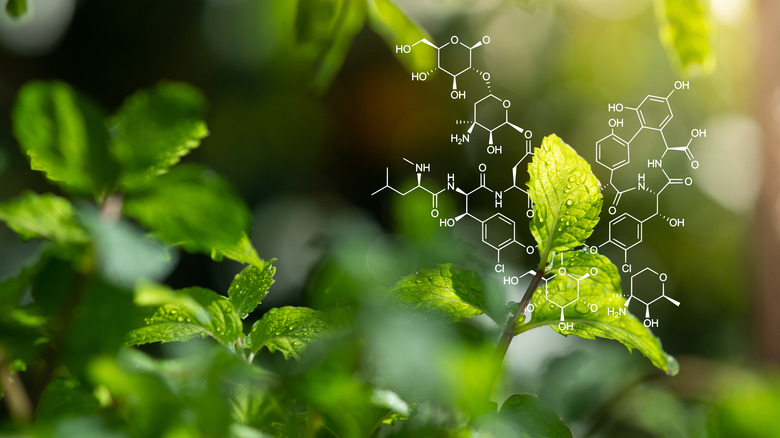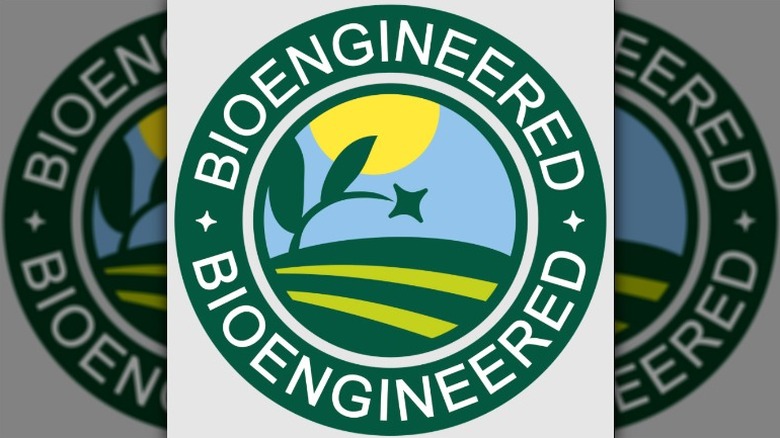Here's What The USDA's New 'Bioengineered' Label On Your Food Really Means
If you're an avid food label reader, pull up a chair and grab a coffee from your local grocery store because you have some research to do, thanks to the new bioengineered food label requirement in the U.S. In an effort to consolidate multiple labels for genetically modified foods into one standard label, the U.S. Department of Agriculture has implemented a new system starting January 1, 2022 (per USDA).
According to the FDA, a genetically modified organism (GMO) is "a plant, animal, or microorganism that has had its genetic material changed." The FDA states that GMOs are scientifically analyzed before being made available to the general public and are as safe and healthy to eat as any other food that has not had its DNA modified. However, over the past two decades, many consumers have become increasingly aware of and sometimes opposed to genetically modified foods for various reasons (via Scientific American). After becoming accustomed to current GMO food labels, consumers will now need to familiarize themselves with a new system.
What will the new labels mean?
The USDA has a new mandatory national standard for labeling genetically modified food products that will require foods formerly tagged as "GMO" to be labeled "bioengineered," according to The Washington Post. The National Bioengineered Food Disclosure Law passed by Congress in 2016 called for the USDA to establish a standard requiring all food manufacturers, importers, and retailers to disclose whether or not their foods or food products have been genetically modified (per USDA).
The new standard does away with familiar terms like "GMO" and replaces them with a uniform round green label that says "bioengineered" or "derived from bioengineering." Regulated food products can provide more information to consumers by including phone numbers, text options, and digital links with the new label. Foods in small containers will have to provide contact information for consumers who want to know if their product is modified. Familiar certifications like "USDA Organic" and "Non-GMO Project Verified" will still be allowed.
Processed foods that contain less than 5% of bioengineered ingredients will not be required to carry the new labels. Peter Lurie, the president of Center for Science in the Public Interest told The Washington Post that for foods "that list meat, poultry or eggs as their first ingredient or their second ingredient after water, stock or broth," the labeling requirement will be voluntary. Dietary Supplements will comply with the new labeling law. Very small food manufacturers, restaurants, cafeterias, and other prepared food providers are exempt from the requirement.
How will the new labels affect consumers and food producers?
Although the USDA aimed to rectify a labeling system that was formerly created by each state with a national standard, there are many requirements and loopholes that consumers and food producers find concerning (via The Washington Post).
The consensus among advocates of the new food label requirements is that a uniform system will help consumers identify bioengineered foods more easily. It also provides a new term for food producers to use that is different from the negative connotation associated with the "GMO" label.
Some watchdog groups and consumer advocacy agencies are concerned that the new requirements don't go far enough and are letting too many bioengineered foods get into the market unlabeled. There is also a concern for consumers who don't have smartphones or cell service, as they won't be able to access information about food products as easily as others.
The USDA shares that consumers should soon be seeing the new bioengineered labels if they haven't already, as the "mandatory compliance date" was January 1, 2022.


